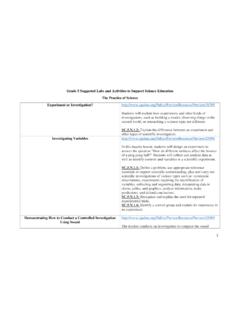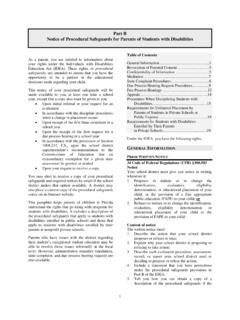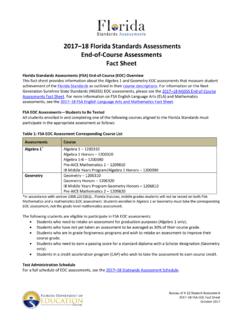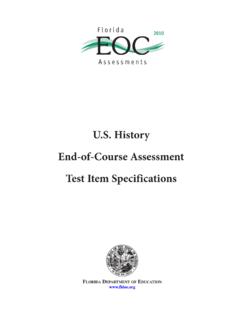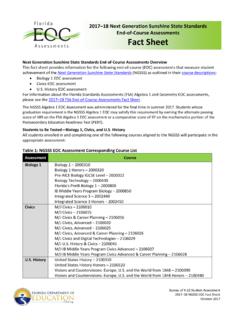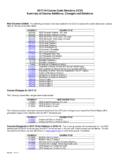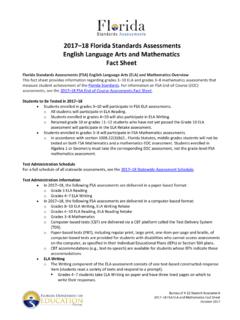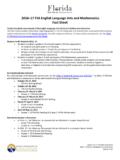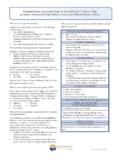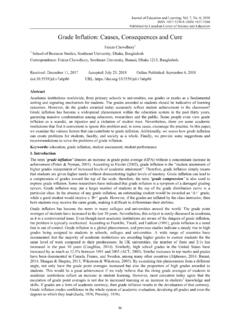Transcription of Next Generation Sunshine State Standards Social Studies 2021
1 Next Generation Sunshine State Standards . Social Studies , 2021. History The Sunshine State Standards were first approved by the State board of education in 1996 as a means of identifying academic expectations for student achievement in florida . The Next Generation Sunshine State Standards (NGSSS) for Social Studies were approved by the State board of education in December 2008. These Standards included content aligned with the following strands: American History, Geography, Economics, Civics and Government, World History, and Humanities. Psychology and Sociology strands were adopted in 2013 and a Financial Literacy strand was adopted in 2014. The revised Civics and Government Standards and new Holocaust education Standards were driven by legislative action and presented for adoption to the State board of education in July 2021. Revised Civics and Government Standards House Bill 807 (2019) required the florida department of education (FDOE) to complete a review of the statewide civics education course Standards .
2 An online review system was used to specifically review Civics and Government Standards . This system utilized the same rubric originally employed for the highly successful Executive Order 19-32 English Language Arts and Mathematics Standards review in 2019. The K-5, 6-8 and 9-12 Standards review forms enabled reviewers to thoroughly evaluate and comment on each standard, as well as the option to provide an overall comment for each grade cluster of Standards . The review opened to the public on June 5, 2020 and closed on August 5, 2020. Data from the online reviews were collected and analyzed after the review closed on August 5, 2020. The data included quantitative and qualitative ratings for each individual benchmark and overall comments for the K-5, 6-8 and 9-12 review forms. The FDOE convened a workgroup of florida experts to propose revised Standards that reflect the themes from the review of the statewide civics education Standards review.
3 The revised Civics and Government (CG) Standards reflect the following priorities for K-12 Civics and Government teaching and learning in florida schools. Students study primary source documents to understand the philosophical underpinnings of the American Republic and the root cause of American exceptionalism. Students compare the success of the United States and the success or failure of other nations'. governing philosophies to evaluate their past, present and likely future effects. Students have a sense of civic pride and participate regularly in all levels of government. Students reflect upon United States civic history, so they understand their rights and responsibilities as citizens, including the process of advocating properly with government officials. New Holocaust education Standards House Bill 1213 (2020) directed the FDOE to prepare and offer Standards for Holocaust education .
4 A new strand of content Standards was added to Social Studies for Holocaust education . To develop content-rich and developmentally appropriate Holocaust education Standards for florida 's students, the FDOE worked closely with the Commissioner of education 's Task Force on Holocaust education and florida teachers. Additionally, the FDOE received and considered comments from State and nationally recognized Holocaust educational organizations, florida educators, school administrators, representatives of the florida College System and State universities, business and industry leaders and the public. 2. Benchmark Coding Scheme The Standards are associated by Strands. The coding provided below directs the user to which strand each benchmark is associated. SS. 5. CG. 1. 1. Subject Grade Strand Standard Benchmark Level Strands CG = Civics and Government (2021).
5 C = Civics and Government (2008). HE = Holocaust education FL = Financial Literacy A = American History W = World History H = Humanities P = Psychology G = Geography E = Economics S = Sociology 3. Next Generation Sunshine State Standards for Social Studies 2021 Revised Civics and Government (CG) Strand Kindergarten Standard 1: Foundations of Government, Law and the American Political System Identify the purpose of rules and laws in the home and school. Students will define rules as Standards of responsible behavior ( , rules for home and school). Students will define laws as a system of rules intended to protect people and property that are created and enforced by government ( , speed limit). Students will identify what can happen without rules and laws. Identify people who have the authority and power to make and enforce rules and laws. Students will identify authority figures in their school and community including, but not limited to, parents, teachers and law enforcement officers.
6 Standard 2: Civic and Political Participation Describe and demonstrate the characteristics of being a responsible citizen. Students will identify examples of responsible citizenship. Students will demonstrate that conflicts can be resolved in ways that are consistent with being a responsible citizen. Students will explain why it is important to take responsibility for one's actions. Describe ways for groups to make decisions. Students will practice decision-making in small and large groups through voting, taking turns, class meetings and discussion. Students will identify examples of responsible decisions. Define patriotism as the allegiance to one's country. Students will identify patriotic holidays and observances ( , American Founders Month, Celebrate Freedom Week, Constitution Day, Independence Day, Martin Luther King Jr. Day, Medal of Honor Day, Memorial Day, Patriot Day, Veterans Day).
7 Students will recognize that the Pledge of Allegiance is an oath that affirms American values and freedom. Students will identify I pledge allegiance to the flag of the United States of America and to the republic for which it stands, one nation under God, indivisible, with liberty and justice for all as the Pledge of Allegiance. Recognize symbols that represent the United States. Students will recognize the American flag, the bald eagle and the President as symbols that represent the United States. Recognize symbols that represent florida . Students will recognize florida 's State flag and State nickname ( The Sunshine State ) as symbols that represent the State . Grade 1. Standard 1: Foundations of Government, Law and the American Political System Explain the purpose of rules and laws in the home, school and community. Students will explain the role that rules and laws play in their daily life.
8 Students will explain the difference between rules and laws. Describe how the absence of rules and laws impacts individuals and the community. Students will provide examples of rules and laws in their lives and in the community. Students will recognize that disorder, injustice and harm to people can occur when there is an absence of rules and laws. Standard 2: Civic and Political Participation Explain the rights and responsibilities students have in the school community. Students will identify the rights ( , treated with respect, physically safe learning environment) and responsibilities ( , come to school on time, do not damage school property) students have as members of their school community. Students will define rights as freedoms protected by laws and, in the school community, freedoms protected by rules. Students will define responsibilities as things citizens should do to benefit the community.
9 Describe the characteristics of citizenship in the school community. 4. Students will identify characteristics of responsible citizenship ( , respect others' property, treat people with dignity, care for environment, treat animals with kindness). Students will identify characteristics of irresponsible citizenship ( , damaging school property, bullying). Recognize ways citizens can demonstrate patriotism. Students will discuss appropriate ways to show respect during the Pledge of Allegiance and National Anthem ( , stand at attention, face the flag, pause conversations). Students will discuss how to show respect for the American flag ( , how to properly display and dispose of the American flag). Students will discuss how to demonstrate patriotism during patriotic holidays and observances ( , American Founders Month, Celebrate Freedom Week, Constitution Day, Independence Day, Martin Luther King Jr.)
10 Day, Medal of Honor Day, Memorial Day, Patriot Day, Veterans Day). Recognize symbols and individuals that represent the United States. Students will recognize the national motto ( In God We Trust ) and We the People as symbols that represent the United States. Students will recognize Benjamin Franklin, George Washington, Daniel Webster and Martin Luther King Jr. as individuals who represent the United States. Recognize symbols and individuals that represent florida . Students will recognize that the State motto ( In God We Trust ) and the State day (Pascua florida Day) are symbols that represent florida . Students will identify the current florida governor and recognize the governor as an individual who represents the State . Standard 3: Structure and Functions of Government Recognize that the United States and florida have Constitutions. Students will define a constitution as an agreed-upon set of rules or laws.
